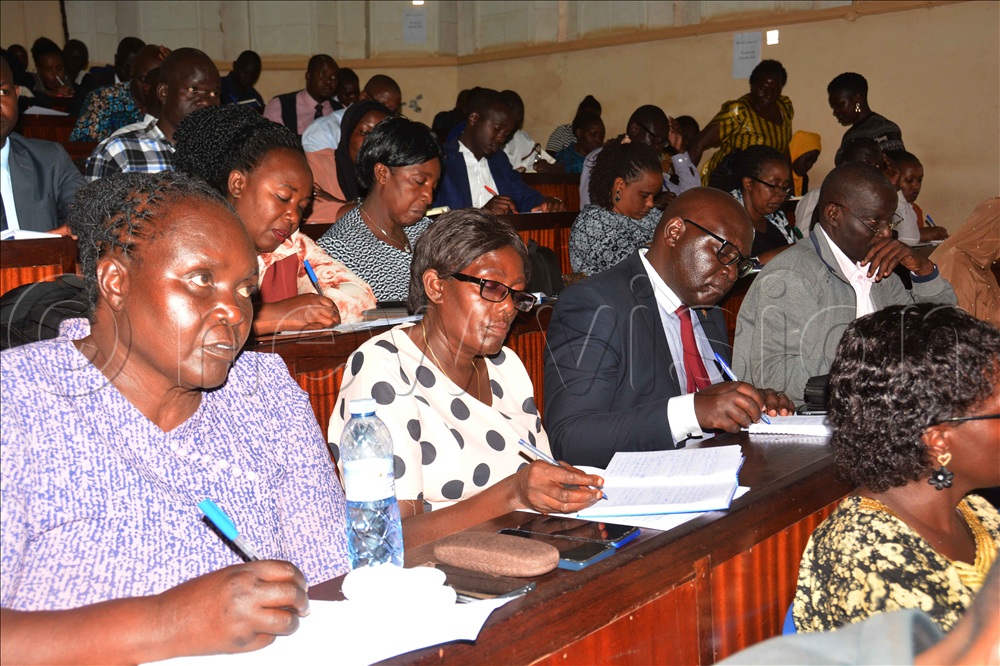Makerere PhD programme to address gaps in early childhood education
According to Prof. Mugagga, the PhD programme is expected to be submitted to the University Council for review by January 2026.
Prof Anthony Mugagga addressing participants during the ECD policy awareness workshop at Makerere University on September 19, 2025. (Photos by Francis Emorut)
________________
Makerere University is breaking new ground with the development of Uganda’s first PhD programme in Early Childhood Development (ECD), a move that underscores its growing commitment to transforming nursery and pre-primary education.
This was revealed during an ECD policy and competence-based curriculum workshop hosted by Makerere’s College of Education and External Studies together with the Ministry of Education. The event took place on September 19, 2025, at Makerere University.
Professor Anthony Muwagga Mugagga, Principal of the college, emphasised the university’s dedication.
“The initiative is intended to strengthen collaborations to confirm Makerere’s commitment to early childhood education,” he said.
According to Prof. Mugagga, the PhD programme is expected to be submitted to the University Council for review by January 2026.
Rising demand
Demand for early childhood education programmes at Makerere has surged.
What were once qualifications pursued mainly by diploma holders or those with field experience are now being sought by high-achieving A-level applicants.
“Last year we had 500 applying; we were able to take 110. This year, we had about 1,000 applying, we were only able to take 120,” Prof. Muwanga revealed.
This surge has exposed two pressing issues: limited teaching staff and insufficient physical space.
“When you have 1,000 applying and you take almost 1%, it is a shame,” he noted.
Across section of participants during the ECD policy awarness workshop at Makerere University on September 19, 2025. 
At the same time, he sees this interest as a hopeful sign that people are increasingly recognising the value and importance of high-quality early childhood education.
Why the PhD is needed
According to the professor, the Council has requested the development of a PhD in ECD to cater for “new developing pedagogies in early childhood education.”
The doctorate is envisioned not just as an academic programme but also as a driver of innovation in how children are taught, how curricula are developed, and how early childhood teachers are trained.
Professor Muwanga warned against treating nursery education like secondary-level instruction, a misstep he believes undermines early childhood learning.
Early Childhood Development in Uganda has long faced notable gaps. According to UNICEF Uganda, only around 10% of children aged three to five are enrolled in formal pre-primary schools.
Most preschools are privately run, underfunded, and unevenly distributed, favouring urban areas over rural ones.
Teacher quality
Officials are also pushing institutions to align more closely with national competence needs.
Annet Mugisha, commissioner at the Directorate of Education Standards in the ministry, emphasised that the quality of teachers directly shapes the quality of citizens a country produces.
“The pre-primary teacher we aim to produce must be knowledgeable, skilled, and committed to nurturing a child’s holistic growth and development,” she said.
She called for greater coordination and collaboration among training providers, urging institutions not to work in isolation.
According to Mugisha, peer learning and dialogue at regional and national levels will help raise standards across the sector.
Mugisha also reiterated a policy directive that has been in force since 2014, requiring all certificate- and diploma-awarding institutions to affiliate with degree-awarding universities. She described this as a critical quality assurance mechanism.
“All institutions are required to submit their graduation books and lists up to December 2024 to the TETD Registry by October 31, 2025,” she added, noting that timely and accurate records are vital for policy planning and decision-making.
Qualifications
On the qualifications side, the existing basic requirements and minimum standards (BRMS) framework and more recent policy drafts set out clear demands for nursery teachers’ academic credentials.
According to the education ministry’s call for the development of new preschool BRMS (September 2023), individuals involved in early childhood education must hold at least a bachelor’s degree in education or a closely related field, such as early childhood education, psychology, or teacher education, and preferably a postgraduate degree in early childhood education where applicable.
By introducing a PhD programme in ECD, Makerere aims to close a critical gap: the need for locally trained experts who can lead policy, research, teaching, and interventions in early childhood education at the highest level.